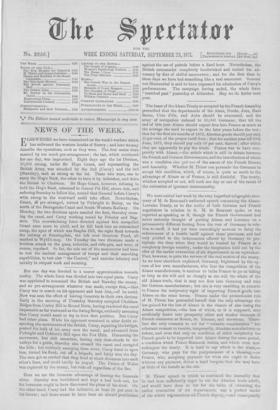We were misled last week by the very imperfect telegraphic
sum- mary of M. de Remusat's awkward speech concerning the Alsace- Lorraine Treaty, as to the motive of both German and French negotiators in relation to it. M. de Remusat spoke, or was reported as speaking as if, though the French Government had never seriously thought of putting Alsace and Lorraine on a permanently different footing from the rest of Germany in rela- tion to tariff, it had yet been exceedingly anxious to delay the enforcement of a hostile tariff against these' provinces, and had only yielded to the inducements offered by Germany to pre- cipitate the time when they would be treated by France as a completely foreign country, under the temptation held out by the offer of the earlier evacuation of six departments as an equivalent. That, however, is quite the reverse of the real motive of the treaty. As we have elsewhere explained, Germany, frightened by the up- roar of her own manufacturers, who fear the competition of the Alsace manufacturers, is anxious to bribe France to go on taking as long as she will and as cheaply as she will the whole of the old Alsace trade, that it may not flow into Germany and ruin the German manufacturers ; but she is very unwilling to concede to France the reciprocity right of importing French goods into Alsace on the same terms. France under the protectionist rule of M. Thiers has persuaded herself that the only advantage she has gained for the loss of Alsace is the chance of also losing the Alsace competition,—the loss of which, as it is supposed, may artificially foster into prosperity other and weaker elements of French commerce at Rouen, St. Etienne, and elsewhere. There- fore she only consents to sell for " valuable consideration " her reluctant consent to receive, temporarily, Alsatian manufactures as before, and oven that only on condition of strict reciprocity for French goods to be imported into Alsace during the same period, a condition which Prince Bismarck resists, and which even now endangers the treaty. It is hard to say which is the wiser,— Germany, who pays for the postponement of a blessing,—or France, who, accepting payment for what she ought to desire without any payment, drives a hard bargain that she may have as little of the benefit as she can.






























